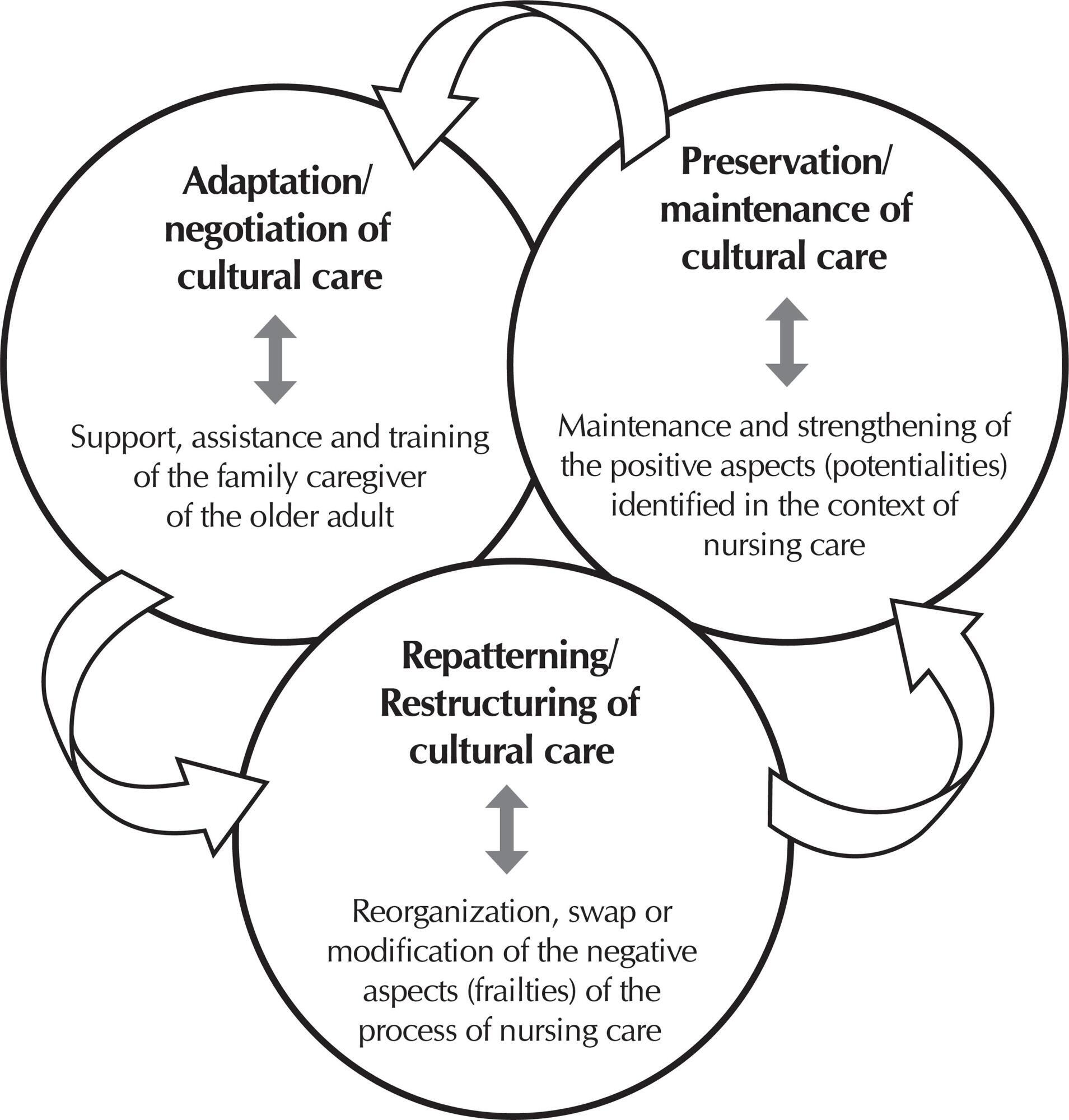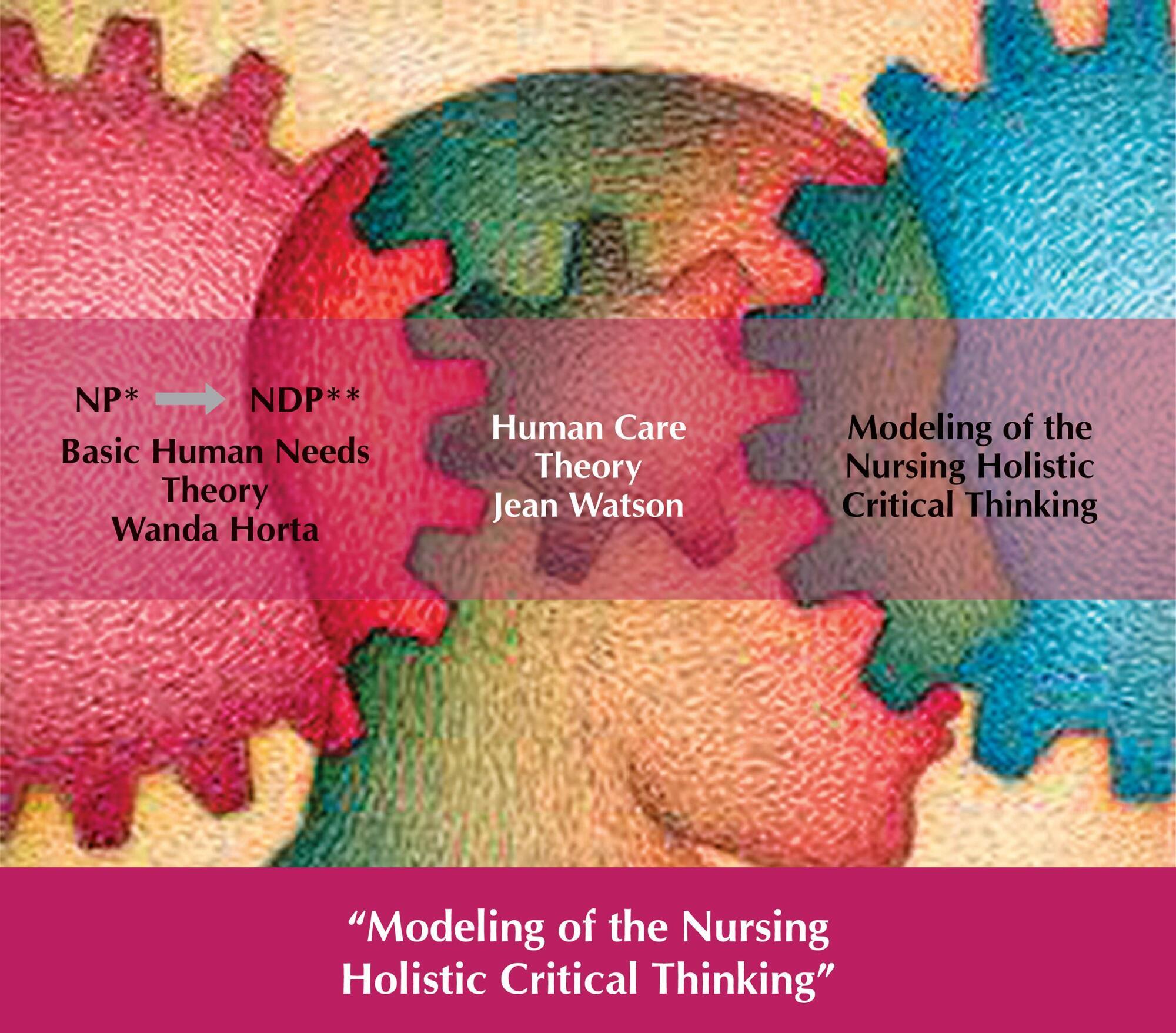-
RESEARCH01-01-2018
Family caregiver of older adults and Cultural Care in Nursing care
Revista Brasileira de Enfermagem. 2018;71(3):959-966
Abstract
RESEARCHFamily caregiver of older adults and Cultural Care in Nursing care
Revista Brasileira de Enfermagem. 2018;71(3):959-966
DOI 10.1590/0034-7167-2017-0105
Views0See moreABSTRACT
Objective:
To analyze the experiences of family caregivers of dependent older adults, who show performance overload and emotional distress, using the Theory of Culture Care.
Method:
Qualitative study with nine caregivers of home care dependent older adults, based on Grounded Theory.
Results:
The findings allowed the identification of potentialities and frailties in the context of family home care and subsidizing the construction of a theoretical scheme resulting from the analysis of possibilities of the nursing care practice according to the culture, through the three modes of action: maintenance, adjustment and repatterning of cultural care.
Final considerations:
Respecting the cultural values and family beliefs, the nurse can help to institute mutually established changes, promoting a better quality in the nursing care relationship and a relief to the strain of the role of the caregiver.

-
RESEARCH01-01-2018
Nursing care to patients with diabetes based on King’s Theory
Revista Brasileira de Enfermagem. 2018;71(3):1092-1098
Abstract
RESEARCHNursing care to patients with diabetes based on King’s Theory
Revista Brasileira de Enfermagem. 2018;71(3):1092-1098
DOI 10.1590/0034-7167-2016-0268
Views1See moreABSTRACT
Objective:
To verify the effectiveness of nursing interventions based on the Imogene King’s Theory of Goal Attainment, on improving care for people with diabetes and adherence to treatment.
Method:
Quasi-experimental, longitudinal, randomized, simple study in a Primary Health Care Unit, in the city of Fortaleza, Ceará state, Brazil. The sample consisted of 60 people with diabetes, divided into intervention and control groups, whose collection occurred from February to August 2013.
Results:
In the intervention group, a significant adherence of the patients to the goals defined in the study was found. In the control, there was improvement in some aspects of the treatment.
Conclusion:
With these results, it was possible to conclude the feasibility of using Theory of Goal Attainment in the positive aspects for adherence to diabetes treatment and improvement of quality of life.
-
REFLECTION01-01-2018
Contributions of Jean Watson’s theory to holistic critical thinking of nurses
Revista Brasileira de Enfermagem. 2018;71(4):2072-2076
Abstract
REFLECTIONContributions of Jean Watson’s theory to holistic critical thinking of nurses
Revista Brasileira de Enfermagem. 2018;71(4):2072-2076
DOI 10.1590/0034-7167-2017-0065
Views0See moreABSTRACT
Objective:
to reflect on the contributions of Jean Watson's theory to the nurses' holistic critical thinking.
Method:
This is a theoretical reflection article, on which scientific productions about Jean Watson's human care theory, published in national and international periodicals, were based.
Results:
Jean Watson's theory and its contribution to the nurses' holistic critical thinking; the interface of critical holistic thinking in teaching the nursing diagnosis process according to Watson's theory; contributions of critical holistic thinking to the nursing field.
Final considerations:
Jean Watson's theory is based on the humanistic aspects and on the ethical and spiritual dimensions of care, considering the characteristics of each individual and their bio-psycho-spiritual-social needs, which can contribute fundamentally to the development of holistic critical thinking and to the role of the nurse in care, teaching and research fields

-
RESEARCH01-01-2018
Self-care of men with priapism and sickle cell disease
Revista Brasileira de Enfermagem. 2018;71(5):2418-2424
Abstract
RESEARCHSelf-care of men with priapism and sickle cell disease
Revista Brasileira de Enfermagem. 2018;71(5):2418-2424
DOI 10.1590/0034-7167-2017-0464
Views0See moreABSTRACT
Objective:
To identify self-care demands of men with sickle cell disease and priapism and describe self-care measures in light of Orem's Self-Care Theory.
Method:
This is a descriptive exploratory study with qualitative approach conducted with nine men with a history of sickle cell disease and priapism. Data were analyzed using Orem's Self-Care Theory.
Results:
Some demands were identified: from universal self-care - difficulty in social interaction and solitude, changes in self-image, self-esteem and sexual activity; from development - the experience with priapism and little knowledge about the pathophysiology of the disease; regarding health deviations - pain crises.
Conclusion:
Orem's theory allowed to identify self-care demands, which are essential for the nursing care provided for men with priapism. Nursing has an essential role in the measures for the different demands presented.
-
REFLECTION01-01-2018
Nursing in Collective Health: reinterpretation of objective reality by the praxis action
Revista Brasileira de Enfermagem. 2018;71:710-715
Abstract
REFLECTIONNursing in Collective Health: reinterpretation of objective reality by the praxis action
Revista Brasileira de Enfermagem. 2018;71:710-715
DOI 10.1590/0034-7167-2017-0677
Views0ABSTRACT
Objective:
To discuss the phase of reinterpretation of objective reality of the Theory of Praxis Intervention of Nursing in Collective Health (Tipesc), in search of the praxis that it promotes.
Method:
Analysis of interventions in projects that are based on Tipesc and its results, since the 1990s.
Results:
Developed and implemented projects show that praxis is the way to achieve the aimed changes.
Conclusion:
We concluded that Tipesc is currently the explanatory and interventional theory, since it is grounded on its theoretical bases, which arise from philosophical bases of dialectical and historical materialism.
Keywords:Community NursingNursing ResearchNursing TheoryPublic HealthResearch Methodology in NursingSee more -
RESEARCH01-01-2018
Existential experience of children with cancer under palliative care
Revista Brasileira de Enfermagem. 2018;71:1320-1327
Abstract
RESEARCHExistential experience of children with cancer under palliative care
Revista Brasileira de Enfermagem. 2018;71:1320-1327
DOI 10.1590/0034-7167-2016-0493
Views0See moreABSTRACT
Objective:
To understand the existential experience of children with cancer under Palliative Care from the Humanistic Nursing Theory's point of view.
Method:
This is a field and qualitative research, in which eleven children participated, supported by the Support Centre for Children with Cancer in Paraíba State. To collect data it was used the Story Drawing Procedure. The data were qualitatively analyzed based on Humanistic Nursing Theory.
Results:
From the analysis of the empirical study's subject, the following thematic categories have emerged: children experiencing fear, sadness, anguish and insecurity in the face of their diagnosis and children experiencing fear of their family falling apart because of the possibility of dying.
Conclusion:
It is fundamental the participation of nurses in the Palliative Care to the children with cancer in order to strengthen the trust between the children and the professional to have the relationship of dialogue as central axis.
-
RESEARCH01-01-2018
Pain in the immediate puerperium: nursing care contribution
Revista Brasileira de Enfermagem. 2018;71:1343-1350
Abstract
RESEARCHPain in the immediate puerperium: nursing care contribution
Revista Brasileira de Enfermagem. 2018;71:1343-1350
DOI 10.1590/0034-7167-2017-0345
Views0See moreABSTRACT
Objective:
to analyze the contribution of clinical nursing care to the mother who has recently given birth with immediate postpartum pain based on the Kolcaba's Theory of Comfort.
Method:
qualitative study by the research-care method. Three nurses, who provided care for women in the immediate puerperium as caregiver-researchers and 30 postpartum women, were admitted to a public maternity hospital. A semi-structured interview was used for data collection, from which the thematic analysis of the content was carried out.
Results:
nursing care with influences from the biomedical model was observed, but it expresses concern when being cared for. It offers administration of medications, guidelines and non-pharmacological measures for pain relief.
Final considerations:
nursing care based on the Theory of Comfort contributed to pain relief in the immediate puerperium.




